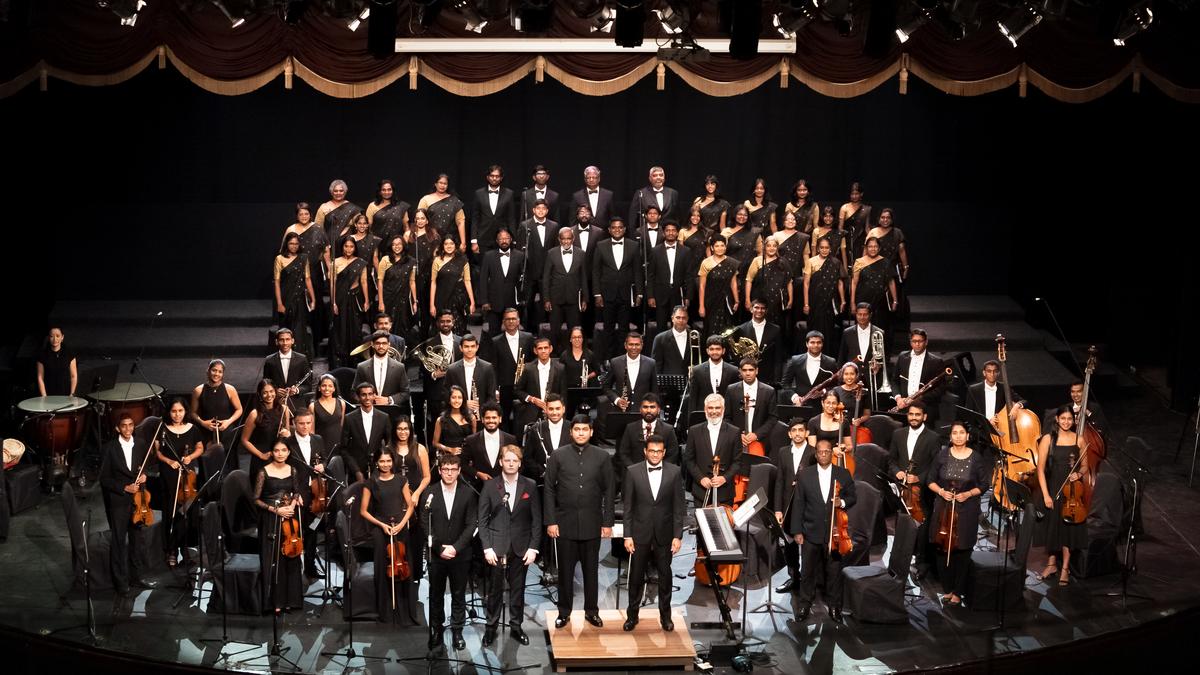Members of Madras Guild of Performing Arts and Gustav Mahler Society of Colombo.
| Photo Credit: Special Arrangement
The Indian premiere of F.J. Haydnâs âThe Creationâ, presented by the Madras Guild of Performing Arts (MGPA), in collaboration with the Gustav Mahler Society of Colombo (GMSC), promised an evening that would transport the audience to the realms of divine artistry. This was the first international tour of GMSC.
Inside the Sir Mutha Venkatasubba Rao Concert Hall, a sanctuary of sound and light, anticipation crackled in the air. The excited whispers of the attendees, a blend of seasoned aficionados and curious newcomers, created a harmonious prelude to the nightâs performance. It took them through Haydnâs masterful depiction of creation inspired by the Book of Genesis from the Bible and John Miltonâs Paradise Lost.
At the helm of this ambitious endeavour was Atul Jacob Isaac, the conductor of the MGPA, whose vision and passion brought Haydnâs masterpiece to life.âI had the privilege of studying and learning the Viennese style of conducting and interpreting composers of this particular century,â Issac shared. âI was excited and honoured to apply that in practise with a choir I led and with an orchestra of a very grounded musical foundation, both in management and skill.âÂ
The performance began with The Representation of Chaos, a soundscape capturing the universeâs nascent tremors.The orchestra painted a vivid tapestry where each instrument contributed to the cosmic dialogue. Strings murmured, brass roared, and woodwinds danced, each note a masterful stroke on Haydnâs expansive canvas.
The transition from C Minor to C Major on the word âlightâ was a moment of sheer brilliance, as the full ensemble played together for the first time. âTheatrically, I had the lights at 70 percent at the start of this piece and when the choir sang âAnd there was light,â the stage was fully lit,â said Issac.Â
Soprano Kristina Ammattil and tenor Ramon Branch Biescas
| Photo Credit:
Special Arrangement
Kristina Ammattil, the distinguished soprano, embodied the roles of Gabriel and Eve with grace and power. Tenor Ramon Branch Biescas, as Uriel, infused his performance with clarity and emotion, while the performance of baritone Maximilian Catalano, portraying Raphael and Adam, resonated with depth and authority. Their performances brought the characters to life, weaving a narrative rich with drama and beauty.
In a moment of cultural fusion, the encore piece, Danno Budunge, added a breathtaking finale. This famous Sri Lankan song, celebrating the glory of Anuradhapura, was composed by Pt Visvanath Lauji, an Indian musician with a deep love for Western classical music. The orchestral arrangement by Manilal Weerakoon enhanced the songâs grandeur, marking a perfect union of Sri Lankan, Indian and Western influences. It was a fitting tribute to the shared heritage and musical bonds between the nations.
Srimal Weerasinghe, conductor of the GMSC, emphasised the significance of this cultural exchange. The performance was not merely a display of musical prowess, but a celebration of human connection and the power of music to transcend language and geography.
This concert raised poignant questions about the future of this art form in the city. How can Chennai nurture a deeper appreciation for Western classical music while celebrating its own heritage? What role do such collaborations play in bridging cultural divides?
Well-known pianist Anil Srinivasan, a pivotal figure in Chennai, highlighted the need for nurturing this burgeoning interest. âDemocratise the listening experience by having more community engagements â demos and workshops. Also, western classical teachers should encourage participation of their students in performances. Allow for more dialogue and discourse.â
Reflecting on the performance, Issac hoped that audiences would take away a deep appreciation for Haydnâs final masterpiece. âWhether seasoned or an amateur, this oratorio will ring in your heart,â he said.
Published – October 10, 2024 01:51 pm IST
